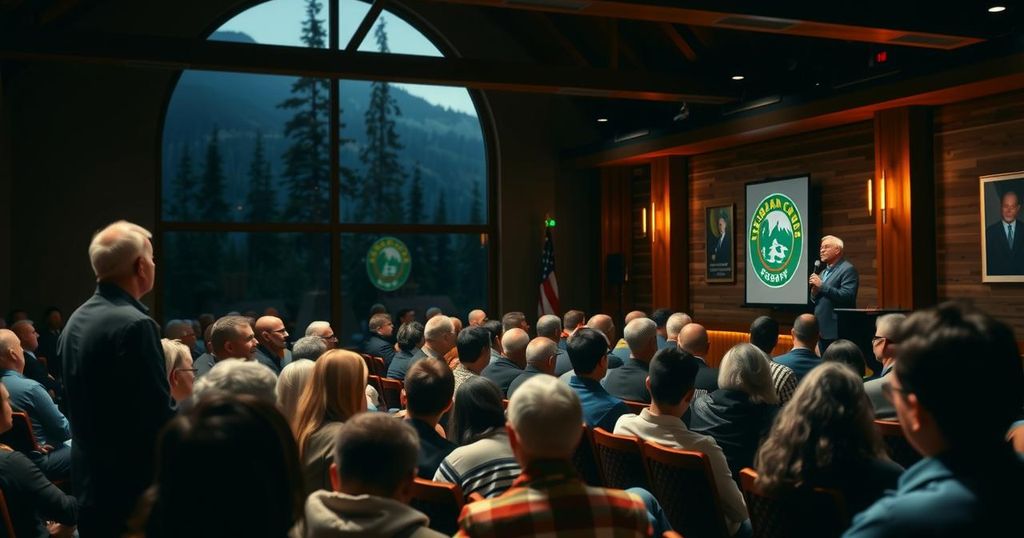Aaron Mair Discusses Intersectionality and Climate Crisis at Human Rights Institute Lecture
On Thursday, the Human Rights Institute hosted Aaron Mair, former president of the Sierra Club, to discuss the impact of climate change on marginalized communities and the necessity for intersectional approaches to environmental justice, following the UN COP 28 summit.
On Thursday, the Human Rights Institute welcomed Aaron Mair, an esteemed activist and former president of the Sierra Club, to deliver a lecture focused on the intersections of climate change and social justice. The event, which took place in Casadesus Recital Hall, was particularly timely, coinciding with the United Nations COP 28 summit aimed at negotiating global responses to climate change. In his discussion, Mr. Mair illuminated the multifaceted dimensions of the climate crisis, emphasizing its disproportionate impacts on marginalized communities. He advocated for an intersectional approach to climate action, addressing the vulnerabilities of various groups disproportionately affected by environmental challenges. Mr. Mair’s extensive background as a dedicated environmental justice advocate was also a focal point of his presentation. He has been active in the fight for a healthy environment for over four decades, notably serving as the 57th president of the Sierra Club and becoming the first Black individual to hold that position. His commitment to equity in environmental matters is underscored by his current role with the Adirondack Council since May 2021. During the lecture, Mr. Mair articulated the urgent need for equitable responses to the climate crisis. He highlighted disparities affecting communities in the United States and nations in the Global South, particularly critiquing the treatment of environmental advocates who face violence and persecution. Mr. Mair remarked on the tragic legacy of Hurricane Katrina, which devastated New Orleans and disproportionately affected Black residents due to systemic inequities in housing policies. He pointed out that “wealth creation [often occurs] off of a crisis on the backs of communities of color.” He urged the audience to actively engage with their communities, emphasizing the significant role of youth in advocating for meaningful environmental change. The lecture also stressed the necessity of combining scientific knowledge with social justice awareness to address climate issues effectively. In Mr. Mair’s words, intersectionality “is an analytical lens and framework” critical to achieving solutions in both environmental and human rights arenas. Furthermore, he committed to rallying support for collective action and urged students to consider the importance of their political engagement in the upcoming elections for the sake of humanity. The institute plans to build on Mr. Mair’s insights with a new course titled “Climate, Crime & Human Rights” available in the winter semester, which will delve into critical narratives surrounding environmental issues and justice. Co-director Alexandra Moore reiterated the institute’s dedication to advocacy for food justice and sustainability, indicating an ongoing commitment to addressing the intertwined challenges of climate change and human rights.
The intersection of climate change and social justice has become increasingly relevant, particularly as global summits and advocacy efforts underscore the urgent need for equitable climate action. Marginalized communities often bear the brunt of environmental degradation and climate-related disasters, which has led to a growing demand for approaches that prioritize equity and inclusion. The engagement of activists such as Aaron Mair highlights the essential link between fighting for environmental justice and advocating for the rights of marginalized populations, suggesting that meaningful solutions must account for the unique vulnerabilities faced by these groups.
In conclusion, Aaron Mair’s lecture at the Human Rights Institute underscored the urgent need for an intersectional approach to tackling the climate crisis, particularly in light of its disproportionate effects on marginalized communities. His insights served as a potent reminder of the importance of advocacy and activism, particularly among youth, in the pursuit of equitable climate solutions. As the institute continues to address these pressing issues, the introduction of relevant courses and community initiatives will further support the fight for environmental justice.
Original Source: www.bupipedream.com




Post Comment